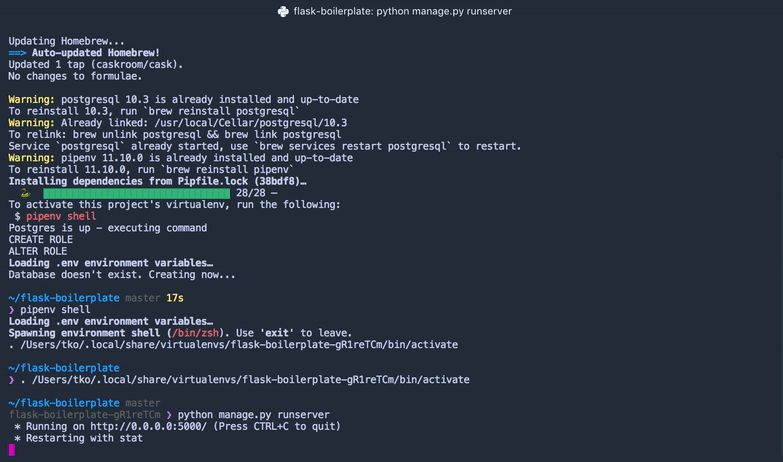Flask Boilerplates: Starter Kits, Admin Panels
Flask is a web application framework written in Python. It is classified as a microframework because it does not require particular tools or libraries. It has no database abstraction layer, form validation, or any other components where pre-existing third-party libraries provide common functions.
Are you looking for a quick way to get started with Flask? Check out this curated list of boilerplates. From simple Hello World examples to more complex projects, you’re sure to find a template that fits your needs.
Top Flask Boilerplate Codes
flask-boilerplate

Flask-boilerplate is a minimal but opinionated boilerplate meant for building out simple REST APIs. It is primarily used at Hack4Impact UIUC, but it can be used by anyone. The app is written in Python 3.6 with Postgres 10 as the chosen data persistence. The default way to deploy the application is with Heroku or Zeit. However, you can also deploy it on other services like AWS, Google Cloud, or DigitalOcean using Gunicorn and Nginx.
flask-boilerplate has three main purposes: to make it easier to get started on new projects, to provide a set of opinions on how to structure Flask apps, and to be a jumping off point for more complex applications. While flask-boilerplate doesn’t force you to use any particular libraries or frameworks, it does include a few of our favorites by default.
This boilerplate was created to allow developers to rapidly produce their API using code that is structured in accordance with best practices while also allowing them to easily add and change features.
cookiecutter-flask
cookiecutter-flask is a great way to get started with Flask and Bootstrap. It provides a lot of the boilerplate code that you need to get started, as well as some great starter templates. I particularly like the fact that it comes with webpack already set up for asset bundling and minification.
This is a huge time saver, and it means that you don’t have to worry about setting up these things yourself. Another great feature is the registration and authentication system. This makes it really easy to add user accounts to your flask app, and it includes all of the necessary security features.
Cookiecutter-flask features Bootstrap 4, Font Awesome 4, Flask-SQLAlchemy, Flask-Migrate, environment variables, Flask-WTForms, Flask-Login, Flask-Bcrypt, Procfile, pytest, Factory-Boy, Click CLI, CSS minification, JS minification, and caching. Using cookiecutter-flask as a starting point for your flask app will give you a great head start on developing a fully featured web application. The included tests and documentation will help you get up and running quickly and easily.
flask-reactjs
flask-reactjs is an open source boilerplate which helps you to build large scale applications. The boilerplate features: SQLALCHEMY with a basic user schema for authentication, Facebook and Google authentication, ReactJS/Redux, Bootstrap v4, Mailgun transactional mails, Webpack asset management, Babel internationalizing, WTForms, timeago jinja filter and a simple json serializer.
flask-reactjs can be used to quickly develop and deploy large scale web applications. Thanks to the included features, you can focus on developing your application without having to worry about the underlying infrastructure.
flask-base
flask-base is a simple Flask boilerplate app that includes everything you need to get started on your next project. With blueprints for user and permissions management, Flask-SQLAlchemy for databases, and Flask-WTF for forms, flask-base has everything you need to get your project up and running quickly.
Additionally, flask-base includes support for gzip compression, Redis Queue for asynchronous tasks, and ZXCVBN password strength checker. CKEditor is also included for editing pages.
Flask Dashboard
Flask Dashboard is an admin panel written in Flask. Some of its features include open-source codebase, up-to-date dependencies, SCSS compilation via Gulp, Bootstrap 5 design, DBMS & tools, modular design with Blueprints, session-based authentication, forms validation, deployment via Docker, Gunicorn / Nginx, and free support via GitHub (issues tracker) and Discord.
api-server-flask
The Flask API Server is a simple, easy to use boilerplate for developing flask applications. The Flask API Server provides a simple, intuitive authentication interface that manages the registration and authentication using JWT tokens.
It comes with JWT authentication, SqlAlchemy, SQLite persistence and deployment scripts via docker. The AuthenticationInterface provides a simple, easy to use authentication management interface that stores and retrieves data using JSON Web Tokens. This makes it perfect for developing APIs for mobile applications or web applications that need to persist data across sessions.
flask-api-starter-kit
Back-end development can be tough. But it doesn’t have to be. flask-api-starter-kit is designed to make your life as a developer easier. It provides a set of tools that are easy to use and fun.
It’s not meant to tell you how to structure your project or provide a comprehensive sample application, but it is intended to offer a set of tools that make back-end development robust, simple, and enjoyable.
The application structure is grouped by file type, so you can easily find what you need. This structure is by no means required – far from it – but it provides a reasonable starting point for most applications. In addition, the starter kit comes with a few basic dependencies installed and configured, such as SQLAlchemy and Flask-RESTful.